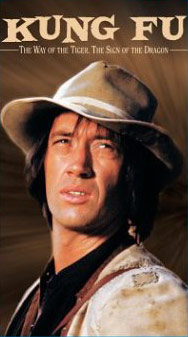
 In Memory: David Carradine and Kung Fu
In Memory: David Carradine and Kung FuThe year 1972 was when I arrived in New York City. The city was bewildering and utterly foreign to this teenager raised in HK. Although adaptation took years, I soon voraciously took up American television. What amazing offerings, and a hugh number of old movies late night.
One of the most intriguing TV shows in that era was Kung Fu, and I was an avid follower. It starred David Carridine, who recently died an unnatural death in Bangkok. I don't know whether this TV series was ever shown in HK. So a little synopsis taken from a wikipedia entry :
"...In the late 19th century, Kwai Chang Caine虔官昌 (David Carradine) is the orphaned son of an American man and a Chinese woman. He has been raised in the Shaolin Monastery, and trained by the monks to be a Shaolin master.
In the pilot episode, Caine’s beloved mentor and elder, Master Po, is murdered by the Chinese emperor's nephew, and Caine retaliates by killing the nephew. In order to avoid execution for his crime, Caine flees from China to western America, where he seeks to find his half-brother, Danny Caine.
Although it is his intention to find Danny while avoiding notice, Caine's training as a priest has instilled in him a sense of social responsibility, forcing him repeatedly to come out into the open to fight for justice. After each such encounter, he is compelled to leave to stay ahead of the emperor's assassins..."
The quirky show is an amalgram of three main elements: (1) the old western, with its dusty border towns, corrupt officials and inevitable triumph of justice over evil; (2) kung fu, newly popular in the West, with all the pacifist philosophy behind the martial arts; and (3) the loner and fugitive in search of justice, and more.For those interested in more details, here is a Kung Fu website with details on every episode.
The show was completely different from anything else. Sometimes it was tranquil to the point of boring; other times the pseudo-Eastern philosophy was a bit tacky. But it was appealing to me for its humanity and its Chinese element. Remember, this was from the era of "make love, not war". Today, it would be hard to imagine an American TV show with such a heavy Chinese element. Like Marco Polo's Travels, it makes one wonder if humans have progressed.
The fugitive element means each episode is tinged by sadness, the inevitable separation at the end looming large even when kindred souls first meet and love germinates. It also means there are guest stars in every episode. From the wikipedia entry above I found out two musicians who are familiar to hifi fans have guest-starred: Cannonball Adderley (he died soon after) and Jose Feliciano, . Here is a little youtube segment:
No comments:
Post a Comment